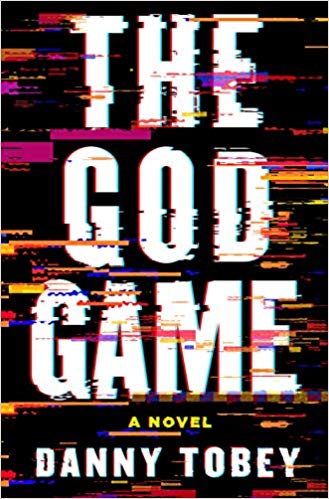The God Game by Danny Tobey is about a group of high school friends who are in a computer club together. They decide to play an online game, the God Game. The game is the result of some computer scientists feeding into an artificial intelligence all of the available information about religion, all religions. The AI then offers players the option to join in a multi-player game. You can interact with the game on your phone and computer, or you can use special virtual reality glasses so the players can see an augmented reality, like Pokemon Go, with characters and images superimposed on the everyday world. The game can use information etc that it can glean from social media and other sources to help make the game seem more real. Do good and you get golds. Do bad and you get blacks. Players can use golds to advance in the game, while blacks may require a special task be performed in penance. Win the God Game and you get everything you desire. Lose the game and you die … in the game, right?
The members of the club are admittedly misfits and each has his or her strengths, weaknesses, circumstances, and parent issues. One has a crush on the most popular girl in school, one wants to get into Harvard to satisfy her parents who have sacrificed everything to give her chances they didn’t have, one was left to help their dying mother when the father couldn’t handle it, and so on. These issues provide a lot of room for the characters to make choices and do good or bad in the story as their senior year progresses. There is plenty of room for conflict and cooperation.
We are familiar with books, TV and movies where we are exposed to a large number of high school dramas. However, those dramas, which seem larger than life to those who are in the midst of them, play out against a backdrop of normalcy. One thing I noticed about the God Game was there was no one who was normal. Everyone, even their parents, other students, and teachers at school, were driven by their flaws. This was a bit over the top and made some of the characters seem more like caricatures. It moved the story along and made sense in terms of their motivations, but their high school was not like any real high school. So, if there is a criticism, that’s it.
I listened to the audiobook version and the reader, Andrew Eiden, did a good job. His voice, cadence, and presentation reminded me a bit of the narrator on the old Twilight Zone. This fit perfectly with the story, which was mainly third person. The story moves a long and you are not sure how it will end.
These days you see a lot of tech luminaries suggesting that there should be some guideline and boundaries for AI. While I don’t imagine that The God Game is what the future holds for us, the worries about the pervasive interconnection of tech is well played out in the story.
